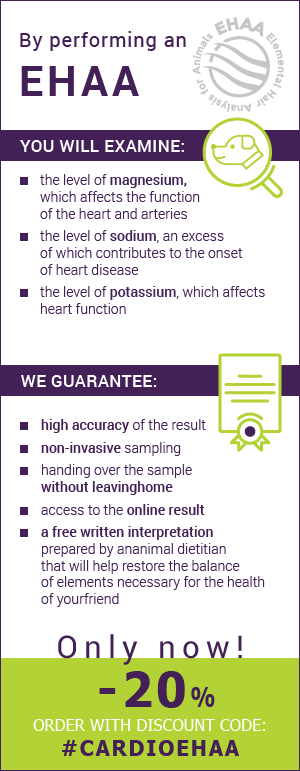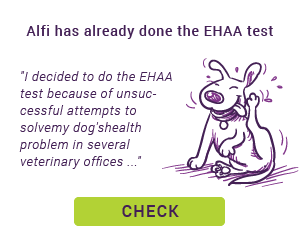Heart disease is chronic and quite common in dogs, irrespective of their age and sex. It can appear in adults and elderly dogs, as well as in puppies. In addition to proper treatment, heart patients also need well-balanced meals. Including ingredients such as omega-3 fatty acids, l-carnitine and magnesium in the diet can help limit clinical symptoms and thus improve your pet’s comfort.
HEART DISEASE
Heart disease is divided into congenital (developmental problems detected already at puppy age) and acquired (developing with age, caused by e.g. bacterial infections). It’s assumed that there are breed predispositions to specific heart diseases. Dogs of large and giant breeds (including the Irish Wolfhound, Newfoundland and Boxer) are more prone to dilated cardiomyopathy, while small dog breeds (e.g. Cavalier King Charles Spaniel, Maltese and Lhasa Apso) are more likely to get valvular insufficiency. All of these diseases lead to insufficiency of the circulatory system and can be very dangerous. That’s why it’s important to carry out preventive testing and to observe your pet closely. Symptoms that are worrying include shortness of breath, coughing after exercise, coughing at night and in the morning, fainting, syncope, wheezing, a reluctance to be active.
OBESITY AND CACHEXIA
It’s important for the diet of dogs with heart disease to be balanced in order to maintain the right body weight. Don’t forget that the effectiveness of treatment is affected negatively not only by obesity, but also by extreme emaciation.
Obesity is a chronic disease characterised by excessive accumulation of fat tissue. Over the last 15 years, the incidence of this disease in pets increased to 36%. In addition to conditions such as hypothyroidism and acromegaly, obesity can be caused by your dog consuming an excessive amount of calories. Many pet owners don’t realise that overweight pets are much more at risk of other diseases. The most-serious of these include diabetes, as well as respiratory and cardiovascular diseases. Overweight pets get tired more quickly, become apathetic and are reluctant to exercise. They often have increased heart rate, arterial hypertension, and disturbances in the excretion of water and sodium from the body.
Cachexia is the most-severe form of malnutrition that occurs in chronic cardiac insufficiency. As a result, the metabolism is disturbed, and the animal loses their appetite and loses weight. It loses not only fat, but also muscle. This can also change the heart mass and inhibit the immune system. Advanced cachexia significantly decreases the effectiveness of treatment and reduces the survival rate. It is seen mainly in dogs with dilated cardiomyopathy, because there is an excessive loss of protein in urine, and problems in absorbing nutrients. That’s why it’s very important to make sure that what you feed your dog is tasty, and that it has enough animal protein, because of its quality. You can improve the flavour of your dog’s meal by heating them or adding a small amount of extras that improve the taste and smell, e.g. tuna juice, goose lard, meat broth (cooked without bones). You can also try feeding your dog from your hand or giving it smaller portions several times a day.
OMEGA-3
The n-3 family of polyunsaturated fatty acids (PUFAs) play a special role in dog nutrition. Particular attention should be paid to eicosapentaenoic and docosahexaenoic acids (EPAs and DHAs), which are found in smaller amounts in the bodies of dogs with heart disease. The body of your pet, similar to other mammals, isn’t able to produce them on its own. That’s why you must provide these acids in food.
EPAs and DHAs help counteract cardiac cachexia. They improve the flavour of pet food, and decrease the production of inflammatory cytokines – proteins that suppress hunger and accelerate the breakdown of muscle proteins. This helps improve your dog’s appetite and limits body mass loss. Fatty acids are also a component of cell membranes, ensuring proper conduction of nerve impulses, which is very important for the work of the heart. Studies have also shown that PUFAs have an antiarrhythmic effect, i.e. they counteract arrhythmias.
The recommended dose of omega-3 acids for heart patients is 40 mg/kg of EPA and 25 mg/kg of DHA. Sources of these acids include omega-3 oil, and krill oil or meal. Pet owners often buy cod liver oil, but in this case you should remember that it contains a high content of vitamins A and D, and these can be overdosed.
L-CARNITINE
L-carnitine is an organic chemical compound that’s synthesised in the body from two amino acids – lysine and methionine. This compound is made, among other places, in the liver, kidneys and skeletal muscles. The main role of l-carnitine is its participation in the metabolism of fats. It transports them to the mitochondria and there, they’re used to produce high-energy compounds. This is one reason why carnitine is very important for the health of the heart, which due to its constant work, has a high need for energy.
In healthy animals, the amount of carnitine made by the body is sufficient to cover the requirement. However, there are some exceptions. There are some dog breeds with a predisposition for heart disease (e.g. Cocker Spaniel and Boxer), and others that have vegetarian diets. A decreased concentration of carnitine in the body also occurs in pets suffering from chronic renal or hepatic failure. An deficiency of this compound can lead to dilated cardiomyopathy.
A natural source of l-carnitine is products of animal origin. Raw meat in particular has large amounts of this compound. In the case of dogs that aren’t fed the BARD diet on a daily basis, you can use supplements in the form of tablets. The recommended daily dose of l-carnitine is 50-100 mg/kg of body weight every eight hours. The effects of this therapy can be seen two to four months of supplementation. No side effects of l-carnitine have been reported; however, an excess in the body can lead to nausea, stomach ache and disturbance of the microflora in the digestive tract.
TAURINE
Taurine is a sulphuric amino acid endogenous to dogs – they’re able to synthesise it. It’s present, among others, in the liver, muscles and heart. It’s a very strong anti-oxidant, thanks to which it protects the heart against the harmful effects of free radicals. In addition, it improves heart function.
Problems with producing sufficient amounts of this amino acids are seen in some breeds that are predisposed to dilated cardiomyopathy, including Newfoundland, Cocker Spaniels and Golden Retrievers. Taurine deficiency can also present in dogs fed foods that are difficult to digest (high fibre) or low in protein. In addition to the above-mentioned cases, taurine supplementation is also recommended for dogs that have already developed heart disease. This can have a positive impact on the activity of the left chamber of the heart and allow doses for heart failure drugs to be decreased.
Products of animal origin are a source of taurine. Similarly to l-carnitine, the largest amount is found in raw meat. Cooking decreases the amount of taurine in the product by up to 75%. Supplements containing this amino acid are available on the market in powder form, which can be sprinkled into dog food. The recommended dose of taurine for predisposed breeds is up to 500 mg/kg of body weight every 8-12 hours.
 MAGNESIUM
MAGNESIUM
Magnesium is a macroelement that plays a wide range of important functions in the body. It takes part in many metabolic reactions and the conduction of nerve impulses. It plays an important role in the process of contraction and relaxation of the heart, and affects the work of arterial muscles.
A magnesium deficiency may lead to cardiovascular damage. Inadequate amounts of this element lead to a weakening of the contractility of the heart muscle and the development of arrhythmias, i.e. irregular heartbeat. Symptoms like ventricular and atrial fibrillation, premature ventricular contractions and tachycardia are then observed. In addition, a magnesium deficiency in heart patients can increase the side effects of heart medications. The reason for low concentrations of this macroelements in the body isn’t just a poor diet, but also problems with magnesium absorption or its loss through urine. That’s why you should remember to include vitamin B6 in your pet’s food, as it helps with magnesium absorption and increases its concentration in plasma and erythrocytes.
Natural sources of magnesium include meat, eggs and seafood. Brewer’s yeast contains the most Vitamin B6. Magnesium oxide is also used in magnesium supplementation. The recommended daily dose of 20-40 mg/kg of body weight.
SODIUM
Sodium is another element that’s important for dogs suffering from heart disease. It’s responsible for the correct functioning of the nervous system, regulates the body’s water management, and together with potassium, impacts muscle tension (including the heart).
In healthy animals, excess sodium is excreted from the body. However, if your dog has circulatory failure, this element is retained in the body, which further advances the disease. During the initial symptoms of heart disease, all you need to do is exclude foods with large amounts of sodium from your pet’s diet. You should avoid snacks such as canned meat for humans, cheese, cold cuts, and kabanos sausages. Owners often give them to their dogs as a snack, even though they’re not recommended even for healthy pets.
The daily sodium intake of dog patients with clinical cardiac insufficiency shouldn’t exceed 30 mg/kg of body weight. Dog food that’s low in this element is usually unattractive, because salt affects flavour. In addition, heart disease is often accompanied by a lack of appetite. If your pet refuses to eat this type of meal, try changing the food or make something more attractive at home.
POTASSIUM
The right concentration of potassium in the body is needed for proper heart function. Together with sodium, it regulates the conduction of nerve impulses and contractions of the heart. In addition, it protects the circulatory system and affects the excretion of sodium by the kidneys, thus preventing the retention of water in the body. You should regularly monitor the concentration of this element in dogs being treated for heart disease. Some cardiovascular disease medications can increase potassium excretion or retention in the body.
SUMMARY
Food plays a significant role in the treatment of heart patients. It helps decrease clinical symptoms and maintain the right condition, allowing your pet to lead a comfortable life. In addition to regular preventive testing, such as auscultation and cardiac echo, it’s worth monitoring the level of elements in the body. An EHAA based on a hair sample allows you to determine whether your dog requires supplementation in any micro or macroelements and to decide how to proceed with its diet.
Eng. Zootechnician, Katarzyna Żmuda

1. Ceregrzyn M., Barszczewska B., Lechowski R. 2019. Podstawy żywienia psów i kotów. Wydawnictwo Edra Urban & Partner. Wrocław
2. Cholewiak-Górlaczyk A. 2018. Suplementacja diety w przypadku chorób serca. Animal-Expert, nr 5
3. Freeman L.M. 2010. Beneficial effects of Omega-3 fatty acids in cardiovascular diseases. Journal of Small Animal Practice, nr 51, s. 462-470
4. Garncarz M., Parzeniecka-Jaworska M. 2015. Wspomagać czy nie wspomagać – suplementy u psów z ciężką chorobą serca. Magazyn Weterynaryjny, nr 09
5. Kurosad A., Sikorska-Kopyłowicz A., Jonkisz P. 2018. Żywienie psów i kotów w chorobach serca. Magazyn Weterynaryjny, nr 01
6. Mínguez R. E. 2020. Otyłość psów i kotów. Wydawnictwo Edra Urban & Partner. Wrocław
7. Olejniczak-Pytel A. Choroby serca psów. http://www.wetkardio.pl/choroby-serca/u-psow
8. Sygocki C. Minerały i witaminy dla psa potrzebne do utrzymania pełni zdrowia. https://vetexpert.eu/blog/skladniki-mineralne-i-witaminy-czego-potrzebuje-twoj-piesdo-utrzymania-pelni-zdrowia















